For Russian civil society, the year 2024, like the previous two years, was marked by the unrelenting war waged by the Russian Federation against Ukraine. Domestically, political persecutions continued throughout the year. The patterns from previous years remained unchanged: direct targeting of individuals, persecution of vulnerable groups and the adoption of repressive laws. Moreover, another horrifying leitmotif of the year was the death of individuals imprisoned for political motives. Alexei Navalny was murdered, four other people died in custody, another two passed away as a result of the consequences of being held in a punishment cell and one died as a result of detention.
One of the turning points of political repression in Russia this year was the «Baymak case» in Bashkortostan, which affected dozens of people. Another significant turning point was the Ankara prisoner exchange between Russia and the West, in which Russia released 16 people, most of them political prisoners. We also witnessed a sharp increase in criminal prosecutions of «foreign agents» and an intensification of the persecution of LGBTQ+ people.
This report is based on data and analysis by OVD-Info, the Sova Research Centre, the Coming Out group, Groza media outlet as well as the Department One and Crew Against Torture human rights projects.
We obtain information on political persecution in Russia from various sources, such as the websites of courts and other government agencies, the media, as well as the persecuted individuals themselves and their relatives. Due to the limited availability of information — in particular, court judgments — and the resulting inability to monitor the persecutions in real time, our data is necessarily incomplete. However, we believe it is both right and beneficial to publish the data we have, contributing to the creation of an objective picture of political persecutions in Russia.
We also publish data on persecutions in the annexed territories of Crimea and Sevastopol, where repression is carried out by Russia’s law enforcement agencies and we are able to verify the data. Regarding the occupied territories of Donetsk, Luhansk, Kherson, and Zaporizhzhia regions of Ukraine, we have made the decision to monitor repression in these regions only this year. For this reason, as well as due to the difficulties in obtaining and verifying information from these regions, we are not yet ready to consider this data on par with that from other places.
If you have any questions regarding our data or would like to collaborate, please contact us at data@ovdinfo.org.
You can also subscribe to our newsletter for data researchers and experts, where we share new reports, data and datasets. Additionally, we have a Telegram channel where we share our data as well.
Politically Motivated Criminal Prosecutions
Currently, prosecution under criminal articles is the most dynamic form of political pressure in Russia and the annexed territories of Crimea and Sevastopol. As of 9 December 2024, a total of 2,976 people in Russia and the annexed Crimea and Sevastopol are facing prosecution for political reasons, and 1,407 people are currently incarcerated. Of these, 390 (28%) are in pre-trial detention awaiting trial, handing down the verdict and its entry into force. The remaining 1,017 (72%) are already serving their sentences.
Political persecutions, detentions and releases
people were charged in politically motivated criminal cases in 2024
Data as of 9 December 2024
The total number of instances of imprisonment in 2024 increased by 25% compared to 2023. The number of people taken to pre-trial detention increased by 185%, while the number of individuals serving their imprisonment sentences decreased by 36%. This suggests that individuals sentenced to imprisonment in 2021 and 2022 are starting to be released (in particular, we are aware of 64 defendants in «anti-war cases» who have already served their sentences or whose prosecution was stopped for other reasons), and that individuals are more often taken to pre-trial detention awaiting trial than was the case in 2023.
The average imprisonment sentence in politically motivated cases has slightly decreased over the past year — from 6.7 years in 2023 to 6.5 years in 2024. However, in «anti-war cases», the average sentence has, on the contrary, slightly increased — from 6 years to 6.2 years.
The number of sentences involving imprisonment has also slightly increased. More than half of the sentences handed down over the past year involve imprisonment — 55% (378 out of 679). In comparison, in 2023, such sentences accounted for 50% (339 out of 671).
Chart of the most commonly used articles by the number of prosecutions initiated in 2023 and 2024
Most of the prosecutions initiated in 2024 were related to Article 205.2 of the Criminal Code («Public calls for carrying out terrorist activities, public justification of terrorism or propaganda of terrorism»). Recently, the authorities have often used this article in instances where people approve of the actions of the Ukrainian army or formations fighting on its side (see the section on prosecutions for anti-war views for more details) or call for the overthrow of the government. According to our data, the number of new prosecutions in 2024 has slightly decreased compared to 2023. This can be explained, in particular, by the fact that we do not find out about all criminal cases in a timely manner. The second and third articles in this «ranking» are Article 212 («Mass riots») and Article 318 («Use of violence against a representative of the authorities») of the Criminal Code. The growth in the number of prosecutions under these articles is connected with the so-called «Baymak case» — a mass criminal prosecution of people who took part in mass rallies in Bashkortostan in January 2024.
In 2024, there was also a sharp increase in bringing «foreign agents» to criminal responsibility under Article 330.1 of the Criminal Code («Evasion from the fulfillment of the duties of a foreign agent»).
Chart of the most commonly used articles by the number of convictions in 2023 and 2024
The largest number of people were sentenced under Article 282.2 of the Criminal Code («Organisation of extremist activities»). It is mostly Jehovah’s Witnesses who receive sentences under this article. We can also note an increase in the number of sentences imposed under Articles 282 («Incitement to hatred or enmity»), 275 («Treason») and 354.1 («Rehabilitation of Nazism») of the Criminal Code.
Lawyers working with OVD-Info have helped 127 defendants in politically motivated criminal cases since the beginning of 2024. They have also provided legal support during 18 searches and 41 interrogations.
Prosecutions for Anti-war Views
defendants in «anti-war» criminal cases
From 24 February 2022 to 9 December 2024
As of 9 December 2024, we know of 189 people who began facing criminal charges in 2024 for anti-war statements. We need to make an important data-specific clarification: Information about the prosecution of an individual may become available much later after the prosecution started. For example, in 2024 we have learned about an additional 112 «anti-war» defendants in criminal cases whose prosecution had begun in one of the two previous years, which means that the total number of people added to the «anti-war» statistics over the year is 301.
The number of defendants in anti-war criminal cases
Reasons for Prosecution
Most often in 2024, defendants in «anti-war cases» were prosecuted for written comments and publications on the Internet. Offline and video statements went second. The number of anti-war statements on the streets and in public places has noticeably decreased, but we still see prosecutions for leaflets, writings on walls and various objects in cities, public events and destruction of patriotic symbols. Still, more people were prosecuted for cooperating with foreigners in 2024 than in the two previous years combined.
Reasons for the initiation of criminal «anti-war» cases
For the first time since 2022, the article used in the largest number of new «anti-war» prosecutions was Article 205.2 of the Criminal Code («Public justification of terrorism»). Last year, the leading article was Article 280.3 of the Criminal Code («Discrediting the Russian army») and in 2022, Article 207.3 of the Criminal Code («Dissemination of deliberately false information about the Armed Forces of the Russian Federation»).
Charges under Article 205.2 of the Criminal Code in connection with anti-war statements are brought, for example, for comments about attacks on the Crimean bridge, drone attacks on Moscow and other regions, as well as for approving of the activities of the Freedom of Russia Legion.
Anti-war articles most often used for bringing charges in 2024
Prosecutions for Words
people were charged in politically motivated criminal cases for their words (statements, comments, publications and videos) in 2024
Main topics that were the reason for bringing criminal charges
Cases of Calls for Terrorism, Extremism or Anti-Government Activities
politically motivated criminal cases under the articles on calls for extremism, terrorism, or anti-government activities were initiated in 2024
Among the defendants are:
- Anastasia Berezhinskaya, a Moscow resident who wrote a comment «approving of Putin’s assassination».
- Daniil S., who posted a photo on VKontakte with the caption «Long live the thieves, death to the cops»;
- Vladimir Dovdanov, deputy chairman of the Congress of the Oirat-Kalmyk people who called on the Ukrainian Armed Forces to destroy Russian military equipment.
Number of cases initiated for calls for terrorism, extremism or anti-government activities
One of the most well-known defendants in criminal cases for the justification of terrorism (Part 1 of Article 205.2 of the Criminal Code) is Alexei Gorinov, a former Moscow municipal deputy who, at the time his case was initiated, had already been imprisoned on charges of spreading «fakes» about the Armed Forces. Gorinov was sentenced in 2024 to three years in a penal colony under the article on the justification of terrorism for his conversation with other prisoners. According to the investigation, he said the following about an explosion on the Crimean Bridge: «Yeah, they’ve blown it up. It’s war. Because Crimea is their territory.» According to the journalist Dmitry Muratov, the other prisoners were placed in one cell with Gorinov on purpose; they tried to provoke him to talk and then record what they heard on a hidden microphone.
In July 2024, the 2nd Western District Military Court in Moscow sentenced the director of the play «Finist Yasny Sokol» Yevgeniya Berkovich and its scriptwriter Svetlana Petriichuk to six years in a general regime colony in a case of justification of terrorism (Part 2 of Article 205.2 of the Criminal Code). The charges against them were brought for the production of «Finist Yasny Sokol», which was directed by Berkovich based on Petriichuk’s play. A «destructological» expertise conducted by the «destructologist» Roman Silantiev affirmed that the play «heroises» ISIS militants and promotes the «ideology of radical feminism».
«Rehabilitation of Nazism» and Desecration of Symbols of Military Glory
In 2024, at least 55 people were tried in politically motivated criminal cases under Article 354.1 of the Criminal Code («Rehabilitation of Nazism»). According to analysts of the Sova Research Centre, many cases under Article 354.1 of the Criminal Code are initiated wrongfully and should be classified under other articles of the Criminal Code or resolved through civil rather than criminal proceedings.
Reasons for initiating cases under Article 354.1 of the Criminal Code («Rehabilitation of Nazism») in 2024
Such criminal cases were also initiated, among other things, for grilling sausages on the Eternal Flame, burning wires in the Eternal Flame, and even for a comment about the opening of a memorial plaque to the «heroes of the Special Military Operation». The blogger Marsel Akhiyaretdinov was prosecuted under Article 354.1 of the Criminal Code for asking Putin to dress the Motherland monument more modestly.
Offending the Feelings of Religious Believers
convictions for offending the feelings of religious believers were handed down in 2024
At least 11 people were prosecuted in 2024 in politically motivated criminal cases for offending the feelings of religious believers.
Among others facing prosecution under this article were:
- The artist working under the pseudonym BFMTH, for the graffiti «Old Orders» located on an embankment in Perm. He depicted Patriarch Kirill wearing a klobuk, the ends of which are folded into silhouettes of a man swinging his arm and a woman dodging a blow. A large pectoral cross hangs between the figures;
- The blogger Olesya Kargina, for a nude photo shoot she did at her lover’s grave;
- Igor Maksimov, a priest of a Greek Catholic parish in Omsk, who hung in the church premises «an icon-styled image of Ukrainian collaborators of Nazism — Banderites — on the background of the Holy Virgin Mary».
Cases of Propaganda of Prohibited Symbols
cases under Article 20.3 («Propaganda and public display of Nazi symbols and symbols of banned organisations») of the Code of Administrative Offences were referred to the courts in 2024
According to the data of the Judicial Department of the Supreme Court of the Russian Federation cited by the Sova Research Centre, the total number of punishments under Article 20.3 of the Code of Administrative Offences («Propaganda or public display of Nazi attributes or symbols, or the attributes or symbols of extremist organisations») and Article 20.3.1 of the Code of Administrative Offences («Incitement to hatred or enmity») imposed in the first half of 2024 amounted to 3,001 (sanctions were imposed a total of 5,163 times in 2023 and 5,270 times in 2022).
A Sova analyst notes: «In 2024, we noted more cases of incitement to hatred against Russians, when in fact it was not about ethnic enmity at all, but about statements criticising the political views or public position of compatriots — say, their political passivity. Usually, these are dealt with in administrative cases under Article 20.3.1 of the Code of Administrative Offences, as in the instance of Igor Vishnyakov, for example, but sometimes in criminal cases under Article 282 of the Criminal Code, as in the instance of the actress Yana Troyanova.
Cases under Article 20.3 of the Code of Administrative Offences are initiated for Nazi symbols or symbols that look confusingly similar to them, symbols of organisations recognised as extremist, as well as other prohibited symbols — symbols of collaborationist organisations, for instance. Cases under this article are also initiated for posting pictures of swastikas or Nazi salutes. In most cases, people may indeed demonstrate such symbols as an element of propaganda of hateful ideology.
However, the list of banned attributes or symbols is constantly expanding, and it includes, among other things, symbols associated with movements that are persecuted for opposing the authorities or are simply unjustifiably recognised as extremist organisations. In the Sova analyst’s opinion, it is worth prosecuting an individual under the article on the demonstration of prohibited symbols only when they genuinely spread propaganda of the relevant ideology. Most instances of prosecution under this article do not involve propaganda though.
Since as early as 2021, after the Anti-Corruption Foundation (FBK) was declared an extremist organisation, even references to FBK and its founder Alexei Navalny have been considered prohibited symbols. People have been fined, for example, for «FBK symbols», for portraits of Navalny that they brought to the Solovetsky Stone, for a photo of the logo with the letters «FBK» posted on VKontakte back in 2018 and one person was arrested for 7 days for a photo of Navalny with the inscription «immortal».
Cases of propaganda of prohibited symbols
The graph above shows that a large number of cases under Article 20.3 of the Code of Administrative Offences are initiated for the symbols of the «Arrestant Criminal Unity» movement (AUE). In August 2020, the Russian Supreme Court declared the «AUE movement» «extremist». The Sova Centre notes that the AUE does not represent a single movement and has no political ideology. Prison tattoos with eight-pointed stars are considered to be the symbols of this movement. People can also be prosecuted for pictures depicting them. This also includes inscriptions «AUE — Arrestant Criminal Unity» on a VKontakte page (15 days of arrest were imposed for this) and on car air fresheners.
After the beginning of the full-scale invasion, Russian authorities also consider various symbols associated with Ukraine to be extremist. In particular, symbols of the Azov Regiment, the slogan «Glory to Ukraine» and the image of a trident are considered extremist. A Moscow resident, Dmitry Tushin, was fined after his neighbour complained to the police. He had a blue ribbon with the letter Z crossed out and a yellow ribbon similar to the coat of arms of Ukraine attached to his bike. Andrey Perelygin, the deputy chief physician of Simferopol Clinical Hospital in the annexed Crimea was arrested for 15 days and fined for public demonstration of forbidden symbols. The formal reason for his arrest was the ringtone on his phone, which was the Ukrainian folk song «Chervona Kalyna» (the Red Viburnum).
In the graph above, the «Other» category includes harassment for images of Slavic symbols such as the Kolovrat and the Svarog square.
At least five fines were imposed for the symbols of Meta — for example, for the Facebook logo on the website of the «Little Sun» kindergarten. We also know about a fine for the Dynamo hockey club scarf bought more than 20 years ago, and a fine for the Israeli flag with the inscription «Israil Terrorist» (original spelling preserved). At least three fines were imposed for the symbols of the «I am/WE are Furgal» movement — for example, for a photo in a T-shirt with the face of the ex-governor. The unofficial, almost spontaneous protest movement of Furgal’s supporters was declared an extremist organisation in 2024.
In addition, in 2024 there were at least 57 cases initiated under this article for displaying symbols of the «International LGBT Movement».
Repeated violation of Article 20.3 of the Code of Administrative Offences («Propaganda or public display of Nazi attributes or symbols, or the attributes or symbols of extremist organisations») is the basis for criminal prosecution under Article 282.4 of the Criminal Code. This article was introduced into the Criminal Code in July 2022 and 67 people have been prosecuted under it since then, Sova reports. In 2024, 44 people were sentenced, up from 23 in 2023.
people were charged under Article 282.4 of the Criminal Code («Repeated demonstration of prohibited symbols») in 2024
According to data of the Sova Research Centre
All 44 people were sentenced for statements and symbols (both online and offline). For example, a resident of the Tomsk region was convicted of not covering his swastika tattoo while in public. In 2024, at least two people were charged under Article 282.4 of the Criminal Code for artistic or political statements: these are the artist Vasily Slonov, charged for a tumbler with prison tattoos, and Konstantin Ledkov, a resident of Nenets Autonomous Okrug, charged for the publication of a screenshot from a video of the singer Shaman, to which Konstantin added «Nazi symbols».
Prosecutions Related to Organisations and Communities
A significant part of politically motivated criminal prosecutions is related to participation (even if only alleged) of people in a certain association, community or group of people that the authorities deem unwanted, or providing assistance to them.
Prosecutions Related to FBK and Alexei Navalny
people were charged in politically motivated criminal cases related to FBK or Alexei Navalny in 2024
According to OVD-Info data as of 9 December 2024
Two people — the Mordovian human rights activist Sergei Maryin and the journalist Natalia Sevets-Ermolina — are facing charges for posts about the murder of Alexei Navalny. Alexei’s former lawyers Olga Mikhailova and Alexander Fedulov left Russia, and three other defendants used to work for Navalny’s FBK headquarters. Four defendants were journalists covering Alexei’s trials, including SOTA Vision correspondents Antonina Favorskaya and Artyom Krieger; as well as Konstantin Gabov, a producer for the Reuters news service, and Sergey Karelin, a videographer for the Associated Press and Deutsche Welle. Seven people were charged with financing FBK and two others — 15-year-old Sebastian Sultanov and the St. Petersburg resident Evgeny Smirnov — are facing charges for graffiti in support of Alexei.
«Extremist» and «Terrorist» Organisations or Communities
In 2024, the Interregional Public Movement «I am/WE are Sergei Furgal», the Tatar People’s Party «Revival», the Omsk Civil Association and the Anti-Russian Separatist Movement, along with its 55 «structural divisions», were declared extremist organisations, among others.
The «Forum of Free States of Post-Russia» and 172 organisations as its alleged «structural divisions» were declared terrorist. At least three organisations from this list were previously recognised as «structural divisions» of the Anti-Russian Separatist Movement. Most of these organisations are decolonial and regional initiatives. The supposedly non-existent organisation «Concept of the V.P.W.» (Vanguard of People’s Will), to which Russia’s law enforcement links the defendants in the «Tyumen case», was also declared terrorist.
people were charged in politically motivated criminal cases for participation in the activities of terrorist or extremist organisations
According to OVD-Info data as of 9 December 2024
Inclusion of an organisation in the list of «terrorists» or «extremists» makes it easier for law enforcement officers to criminally prosecute people associated with these organisations. The large number of regional initiatives on the lists likely indicates that the government is preparing to step up the prosecution of regional and decolonial activists. In case of extremist organisations, such prosecution may carried out under Article 282.1 («Organising an extremist community»), Article 282.2 («Organising the activities of an extremist organisation») or Article 282.3 («Financing the activities of an extremist organization») of the Criminal Code, and in the case of terrorist organisations, under Article 205.4 («Organising a terrorist community») or Article 205.5 («Organising the activities of a terrorist organisation or participation in its activities») of the Criminal Code. In case of Articles 282.1 and 205.4 of the Criminal Code, there is also a danger that law enforcement officers can consider any association of people to be an extremist or terrorist community and declare the activities of this association extremist or terrorist in retrospect. In 2024, cases for the activities of an extremist community were initiated in connection with the Antifa United public page on VKontakte and the Anti-Torture project, which covers instances of torture in Federal Penitentiary Service (FSIN) institutions and publishes personal data of prisoners who, according to the project, collaborated with the prison administration and used violence against other inmates.
Organisations the alleged involvement in which led to the initiation of criminal proceedings in 2024
As the graph shows, the International LGBT Movement ranks third among terrorist and extremist organisations in terms of the number of initiated criminal cases, although the law banning this non-existent movement was adopted as late as November 2023. You can read more about the pressure on LGBTQ+ people in this chapter of the report.
Who Faces Prosecution
Number of persons in politically motivated cases sentenced to imprisonment
Of all those prosecuted in politically motivated criminal cases right now, 82,5% are men (2,482), 17% are women (508) and 0,5% are unknown (15). 90,7% of imprisoned individuals right now are men (1,288), 8,8% are women (125) and 0,5% are unknown (6). Of the people who began facing prosecution in 2024, 21% are women (130), 77% are men (482), and the gender of another 2% is unknown (8).
We do not always know the age of the people facing prosecution. However, based on available data, we can say that in 2024, people aged 31 to 50 faced prosecution most often — a trend that has continued since 2023.
In 2024, politically motivated criminal cases were initiated against at least four minors, the youngest of whom was 14 years old at the time. The oldest prosecuted person against whom a case was opened in 2024 was the 85-year-old Sakhalin human rights activist Mark Kuperman. In total, as of 9 December 2024, the prosecution of 23 people who were minors at the time their prosecution began was still ongoing. Ten of them are now deprived of liberty.
Among the defendants aged 60 and over, at least 54 people started facing prosecution in 2024, of whom 18 are deprived of liberty (they are in custody or have been sentenced to imprisonment). In total, the number of people over 60 years of age deprived of liberty as of 9 December 2024 is 130.
Occupation of the defendants in criminal cases who began facing prosecution in 2024
In comparison, only 28 journalists were charged in 2023, but the number of charged artists was 26 — the same as in 2024.
Defendants in «Anti-War» Criminal Cases
Defendants in «anti-war» criminal cases ranged by gender
The share of women is slightly higher in «anti-war» cases than in other politically motivated criminal cases (16% women versus 83,4% men; the gender of 0,6% is unknown).
The average age of defendants in «anti-war» criminal cases is 40 years.
Defendants in «anti-war» cases ranged by age
Occupation of defendants in «anti-war» criminal cases
Where defendants in «anti-war» criminal cases are now
Prosecution of Journalists
journalists and bloggers are imprisoned right now
OVD-Info data as of 9 December 2024
According to OVD-Info data, 282 journalists and bloggers have been charged in politically motivated criminal cases since 2012, of whom 207 are facing prosecution right now.
Number of defendants in criminal cases from among journalists and/or bloggers
Censorship and restriction on the freedom of speech in the media and exerting pressure on journalists are not a new thing for the Russian authorities. Since the start of the full-scale invasion, this trend has only intensified. We know of at least 1,798 instances of pressure on the media, journalists and bloggers from open sources and reports directly to OVD-Info.
Types of extrajudicial pressure on journalists in 2024
The year 2024 saw a noticeable increase in the number of administrative cases initiated against journalists, which often turn into criminal ones. This is mainly due to cases initiated under the article on the failure to fullfill the duties of a «foreign agent» (Article 330.1 of the Criminal Code). Of the 76 instances of criminal prosecution of journalists in 2024, 15 were initiated specifically under this article, which is the highest number of prosecutions under one individual article.
In addition, compared to last year, there is a 15-fold increase in the number of criminal cases initiated under this article against journalists: in 2023, only four cases were initiated under this article, and only one of them was against a journalist, Alsu Kurmasheva. Her case differs from other cases initiated against journalists under the «foreign agent» article, since she was not charged with repeated evasion of the duties of a «foreign agent» (Part 2 of Article 330.1 of the Criminal Code) but with the fact that she did not provide documents to add herself to the register of «foreign agents» in connection with the collection of information about the military activities of the Russian Federation (Part 3 of Article 330.1 of the Criminal Code).
In previous years (from 2016 to 2022), similar cases under Article 330.1 of the Criminal Code were not recorded; the growth in the number of cases occurred after the tightening of the legislation on foreign agents at the end of 2022 and the simplification of the imposition of fines under Article 19.34 of the Code of Administrative Offenses («Violation of the procedure for the activities of a foreign agent»). It is important to note that for a criminal case to be initiated under Part 2 of Article 330.1 of the Criminal Code (on evading the obligations of a «foreign agent»), it is enough for the «foreign agent» to receive one or two fines under a similar administrative article (Article 19.34 of the Code of Administrative Offences) for the absence of «foreign agent» labelling in their publications and then fail to include that labelling in a publication one more time.
journalist became defendanta in the case initiated under Article 330.1 of the Criminal Code («Evasion of the duties of a ‘foreign agent’») in 2023
journalists and bloggers as defendants in the cases initiated under Article 330.1 of the Criminal Code («Evasion of the duties of a ‘foreign agent’») in 2024
According to the data of Roskomsvoboda, as of this writing, Roskomnadzor has blocked more than 120 thousand pages and sites on the Internet. Moreover, the Russian authorities also block not only content published in Russia and not only Russian-language media, but also foreign media that write about the full-scale invasion of Ukraine and Putin:
- The Volsky District Court (the Saratov region) has blocked a link to a piece on the French news site L’Internaute.
- The Central District Court of the city of Chita (the Trans-Baikal Territory) banned at once three links to the Italian online news outlet Dagospia. This is one of the 50 most popular information sites in Italy.
- The Kirovsky District Court of Omsk has issued a decision to block a piece on the Spanish website Marca that exposed a fake about Vladimir Putin.
Where People Are Prosecuted
Regions where politically motivated criminal cases were initiated in 2024
Most prosecutions in 2024 were initiated in Bashkortostan in connection with the «Baymak case» against participants of the popular gathering on 17 January, the day when the activist Fail Alsynov was handed down his sentence. In addition to this region, as well as Moscow and St. Petersburg, a significant number of prosecutions affected the Sverdlovsk region, Tatarstan and the annexed territories of Crimea and Sevastopol (combined) in 2024.
Pressure on Individuals Prosecuted for Political Motives
In 2024, we became aware of at least 107 instances of exerting additional pressure — that is, physical or psychological violence, denial of medical care or deliberately poor conditions of detention — on defendants in politically motivated criminal cases. Of these instances, 36 involve physical violence and torture.
- A group of law enforcement officers, including police and FSB officers, raided the home of the 60-year-old Kursk resident Sergei Chuikov. During the search, they beat him and requested that he provide the passcode to unlock his phone. Afterward, the security forces covered Sergei’s eyes and took him to an unknown building. In his words, they tortured him there: they beat him and connected an electric current to his handcuffs. A case was initiated against Chuikov for discrediting the Armed Forces of the Russian Federation (Article 280.3 of the Criminal Code) and public justification of terrorism (Article 205.2 of the Criminal Code).
- Rinat Kiramov, sentenced to seven years in the case of organising the activities of an extremist organisation (Part 1 of Article 282.2 of the Criminal Code), while in a medical correctional centre, was requested to provide the names of his fellow Jehovah’s Witnesses believers who live in Akhtubinsk. After refusing to do so, the believer was beaten for several days, and also tortured with water and a stun gun.
In 2024, people prosecuted for political reasons went on hunger strike at least 7 times. The Barnaul journalist Maria Ponomarenko, sentenced to six years in a case of «fakes» about the army (Article 207.3 of the Criminal Code) and charged with using violence against prison staff, went on it twice; she continues to be bullied in prison.
instances of pressure are related to the conditions of detention in colonies and pre-trial detention centres


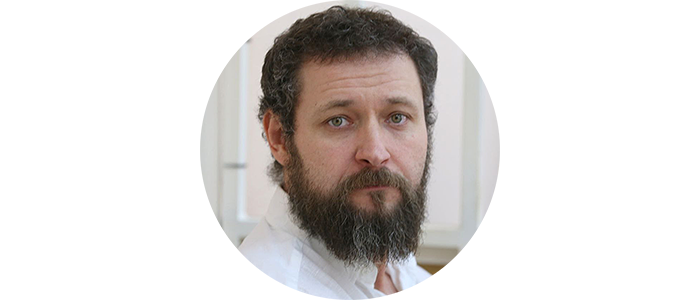
- A resident of the Orenburg region, Alexei Grigoriev, charged with intending to set fire to a military recruitment office and a railway relay box, says that he was deliberately kept in a damp, cold and smelly basement with rats, mildew and mold on the walls.
- The wife of the Crimean Tatar Server Zekiryaev, sentenced to 13 years in a maximum security colony on charges of involvement in the Islamist party Hizb ut-Tahrir, said that he was kept in a cell-type room for several months where he had to breathe strong gas emissions from the camp-wide sewer system around the clock. As a result, according to his wife, he sometimes did not sleep for four days straight and suffocated from the stench and lack of oxygen.
- The lawyer of the blogger Vadim Kharchenko from Gelendzhik, charged under multiple articles including the article on discrediting the army, said that he was being kept in solitary confinement in unsanitary conditions, in a windowless damp basement. Dust and dirt are blown into the room through the bars, and shouting and swearing spread from the neighbouring cells during the night. In addition, there is the sound of one and the same voice that constantly, loudly and monotonously reads the rules and regulations of detention in the pre-trial detention centre.
We are aware of at least 28 reports of denying medical care or providing it in poor quality:

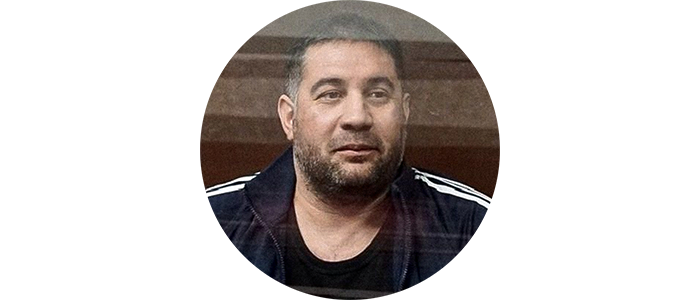
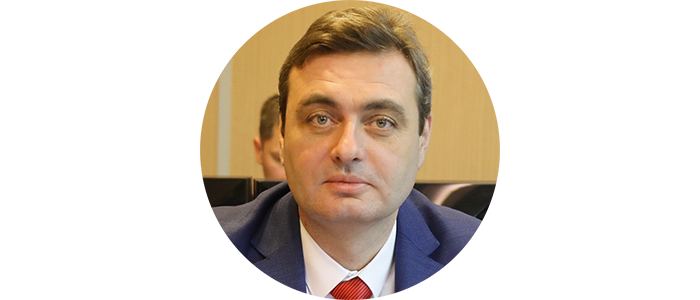
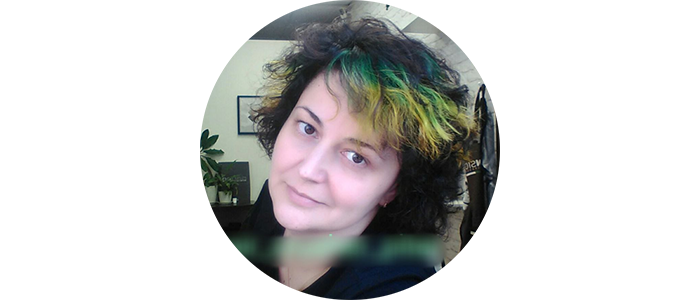
- Alexander Shestun, the former head of the Serpukhov district of the Moscow region who is charged in several criminal cases, was refused a cardiologist visit, and the detention centre’s medical personnel stopped providing him with diabetes and heart medications.
- Timur Yalkabov, a resident of Crimea sentenced to 17 years in a strict regime colony for an alleged connection with the Hizb-ut Tahrir Islamist organisation, has asthma and was refused inhalers until he started suffering from attacks.
- Artem Samsonov, a former deputy of the Primorsky Krai legislative assembly who is charged with child molestation, has been denied medical care for a tumour in his chest. In July 2024, it was revealed that the doctors in the infirmary of Pre-Trial Detention Centre No. 1 had found the tumour as early as the summer of 2023, but took no action.
- Anna Alexandrova, a resident of Saint Petersburg charged with spreading «fakes» about the Russian army in her publications on VKontakte, raised a poster that said «I need a doctor» during a court hearing. Alexandrova demanded a doctor’s appointment at the pre-trial detention centre because she is diagnosed with a chronic illness.
political prisoners died in detention or as a result of its consequences in 2024



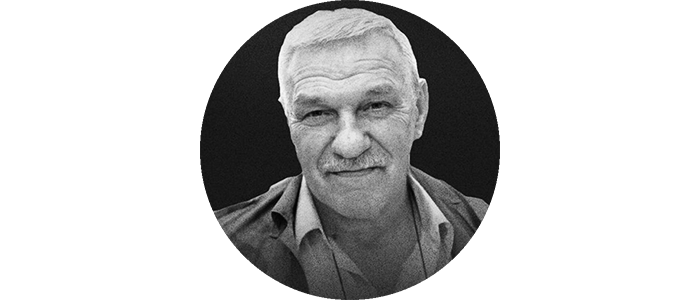
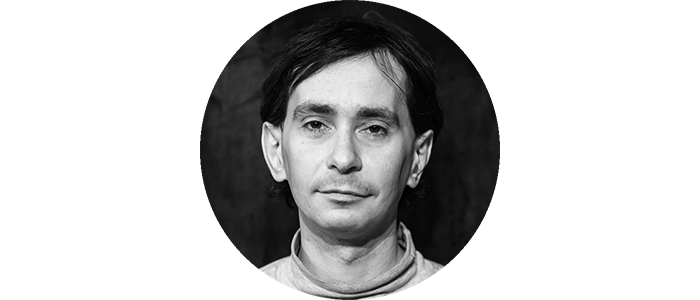



- Alexei Navalny. According to the official version of the Federal Penitentiary Service and the Investigative Committee, the politician became ill after a walk at Correctional Colony No. 3 in Harp, Yamalo-Nenets Okrug, and died shortly thereafter. Journalists and Navalny’s associates later found evidence indicating that Navalny was poisoned in the colony.
- Alexander Demidenko, a volunteer from Belgorod who helped Ukrainian refugees, was charged with an illegal acquisition of explosive devices. Representatives of the Federal Penitentiary Service stated that he had cut his veins in pre-trial detention. Demidenko’s son doubts that.
- Alexander Ishchenko, a prisoner of war who was a driver in the Ukrainian Azov Brigade, died in pre-trial detention in Rostov from his chest «contacting with a blunt object», according to the report by a Ukrainian medical examiner. The report also mentions multiple broken ribs, but it is unclear where and when Ishchenko sustained these injuries.
- Igor Pokusin, a social activist from Abakan, was charged with vandalism after painting over a Russian army propaganda poster and of preparing to commit treason. The elderly activist died 6 months after the latter verdict. Pokusin’s defence noted that he had testified under torture. According to the Memorial Human Rights Defense Centre, he had severe health issues: his knee and hip joints had been replaced with prosthetics, and he had a stent in his heart.
- Pavel Kushnir, a pianist and activist who ran a YouTube channel named «Agent Mulder» with a few subscribers, died as a result of a dry hunger strike at the pre-trial detention centre in Birobidzhan. Kushnir was charged with publicly calling for terrorism. His mother refused an independent examination; according to Kushnir’s friends, his relationship with his family had deteriorated after the annexation of Crimea in 2014.
- Kirill Buzmakov, a Ukrainian-born biker, was a member of a private Telegram chat where its participants discussed the war in Ukraine. Law enforcement officers broke his jaw and tortured him, refusing to take him to the hospital until he confessed to preparing a terrorist act. Buzmakov said that the police had «rotted him down». He was later transferred under house arrest and underwent an operation in the hospital — his jaw had to be surgically removed. He died in his home in Zheleznovodsk.
- Alexander Lubin, a resident of Kurgan Oblast, was charged with participation in the community of Jehovah’s Witnesses. His health deteriorated due to his incarceration in pre-trial detention. After the verdict in the case of organising the activities of an extremist organisation, he was hospitalised in an ICU because he lost the ability to breathe on his own. The believer had a Type II disability, and also suffered from hypertension and polyarthritis.
- Vladimir Kazantsev, a lawyer and human rights defender from Chelyabinsk, was sentenced to four years of imprisonment in a case of fraud. Local eco-activists believe that the criminal charges were brought against him to prevent him from advocating for environmental issues in court. The cause of his death is unknown.
Torture, Cruelty and Violation of the Right to Life
This report is dedicated to politically motivated prosecutions, but political prisoners are not the sole subjects of state violence and human rights violations. This section provides an analysis by the Crew Against Torture (CAT), which collects data on all victims of torture and violence committed by Russian law enforcement. For a prisoner, any form of pressure is a method to inflict additional fear and exert coercion on an individual already trapped in the system.
reports of signs of torture, cruelty and violation of the right to life were registered by the Crew Against Torture
CAT data as of 9 December 2024
CAT staff clarify that they are unable to verify every report that contains signs of violations. Systematising and subsequently analysing the data can take months and, in some cases, even years. Therefore, in a given calendar year, the CAT can only recognise as proven only reports on events from previous years; out of the 300 registered reports, only around 40 undergo qualitative verification.
Extrajudicial Pressure
As of 9 December 2024, we are aware of at least 70 instances of extrajudicial pressure for anti-war positions. By extrajudicial or unlawful pressure, we refer to a wide range of practices aimed at preventing an individual’s political or civil activities without initiating criminal or administrative cases against them. These practices can be divided into criminal and institutional. Criminal practices involve illegal methods of hindering one’s activities, such as threats, destruction of property, assault and murder. Institutional practices involve the abuse by law enforcement agencies and various government officials of their power to achieve the same goals; for example, by threatening to remove an individual’s children through child protection services, deporting unwanted immigrants with the help of the Federal Migration Service and the Federal Security Service (FSB), exerting pressure on businesses, dismissing employees etc.
Extrajudicial persecutions of individuals with anti-war views in 2024
The most prevalent method of extrajudicial pressure in 2024 is threats. The majority of these take the form of coercion to apologise, which has become widespread in recent years. People had to apologise for inviting a Ukrainian singer to a bar, for posting anti-war stories on Instagram and for complaining about a poorly parked military vehicle.
Another common method of extrajudicial pressure is the cancellation of events. This method is aimed at professionals in the area of culture and arts — for example, musicians Kristina Orbakaite and Gleb Samoilov, the literature critic Galina Yuzefovich, the writer Lyudmila Ulitskaya and others.
Politically Motivated Administrative Cases
Cases of Discrediting the Russian Armed Forces
administrative cases under Article 20.3.3 of the Code of Administrative Offences on discrediting the Russian Armed Forces were referred to courts in 2024
Mediazona data as for 5 December 2024
Out of the 2,047 referred cases, courts considered 1,942.
Decisions in the cases of discrediting the Russian Armed Forces
Overall, in 2024, Russian courts received 31% fewer cases of discreding than the previous year. However, it should be noted that at the time of writing this report, December had not yet ended, and the overall difference will eventually be smaller. On average, each month of 2024 (excluding December) saw 27% fewer cases being referred to the courts than in 2023.
Number of administrative cases initiated for political motives
The following five regions had the highest number of administrative cases of discrediting the Russian Armed Forces referred to the courts in 2024:
The annexed territories of the Republic of Crimea and the city of Sevastopol — 468 cases. In the previous year, this region also had the highest number of such cases.
Moscow and the Moscow region — 218 cases.
Krasnodar Krai — 112 cases.
The city of Saint Petersburg — 74 cases.
Sverdlovsk Oblast — 54 cases.
Number of administrative cases of discrediting the Russian Armed Forces initiated in 2024
In 2024, OVD-Info lawyers defended 641 people in 699 administrative cases, six of whom had their sentences reduced. The defenders visited police stations 62 times, assisting 579 individuals. They also provided 973 consultations over the phone and 838 by email. They provided legal assistance in 52 regions of Russia.
Cases of Insulting the State on the Internet and Calls for Separatism or Sanctions
Parts 3 to 5 of Article 20.1 of the Code of Administrative Offences on minor hooliganism, which were introduced in 2019, allow the government to fine citizens for disseminating on the Internet «information that expresses obvious disrespect for society, the state, official state symbols of the Russian Federation, the Constitution of the Russian Federation or bodies exercising state power in Russia, with the use of indecent language offending human dignity and public morality».
cases of administrative offences for insulting the state and society online were referred to courts
According to OVD-Info data from 1 January 2024 to 9 December 2024
In 2023, Russian authorities initiated 178 cases under Parts 3 to 5 of Article 20.1 of the Code of Administrative Offences, which is only 7 more cases than as of 9 December 2024. In 2022, there were more such cases — 234.
What are people fined for under the aforementioned parts of the article? The reasons may be, for instance:
- A comment «great» on Odnoklassniki under a meme with a photo of Vladimir Putin captioned «Vovka piz**bol» («Little Vladimir is a bullsh*tter»);
- Several pictures with Putin in different depictions — in particular, the image of the president portrayed as the rapper Lil Peep with tattoos and pink hair;
- An image with a poster saying that people in uniform and officials are «scarier than COVID».
The pianist Pavel Kushnir, who at the time was in custody on criminal charges of calls to terrorism (Part 2 of Article 205.2 of the Criminal Code) for his anti-war statements, also received a fine under Article 20.1 of the Code of Administrative Offences. The reason for initiating the administrative case was two videos posted on his YouTube channel named «Agent Mulder». In the videos, Kushnir shared his opinion about Putin. Nine days after the court decision, on 28 July 2024, Pavel died in pre-trial detention after a prolonged hunger strike.
Prisoners of the Wartime
This chapter briefly summarises the year in review. In the November issue of «Prisoners of Wartime» report, we detailed three major trends in prosecutions on charges of radical anti-war activities:
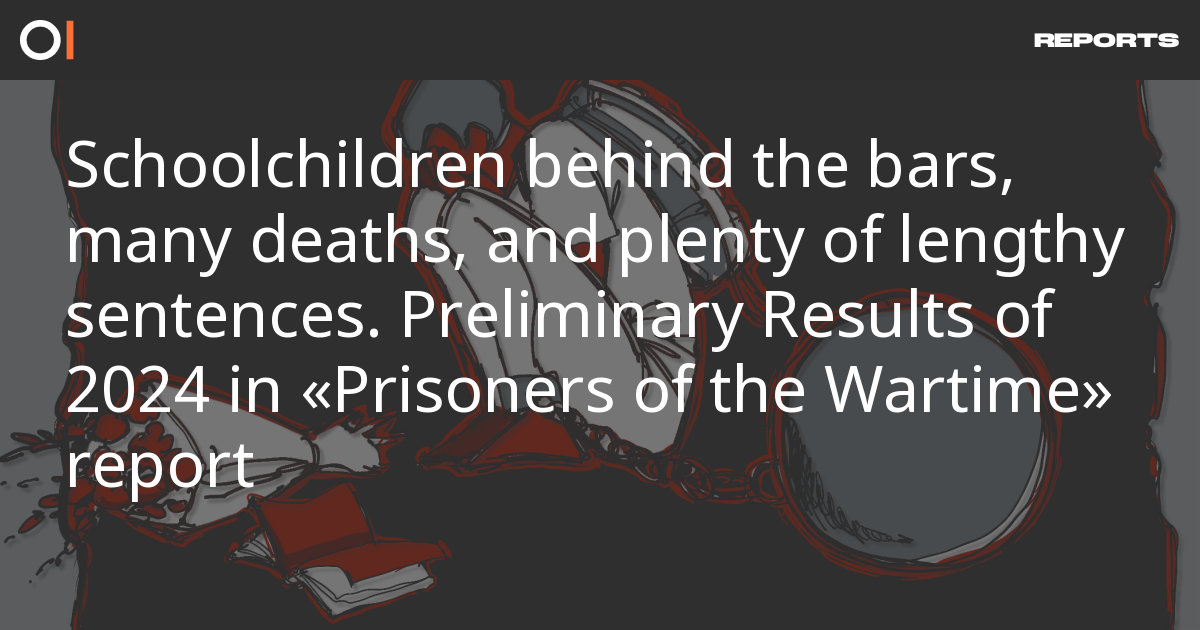
Prosecutions for treason, terrorism and sabotage have intensified in connection with Russia’s full-scale invasion of Ukraine. This is partly caused by more radical protest actions by opponents of the war and partly to the state’s desire to create an image of intense struggle against «internal enemies». The disproportionate severity of punishment, the «industrial scale» of prosecutions, frequent use of torture, information about trumped up charges and provocations oftentimes coupled with the lack of at least somewhat detailed information about most cases make monitoring these stories important. We do not always know whether the defendants are guilty of what they are charged with or what their position is, but we still try to provide a complete picture of repression.
Charges of Helping the Ukrainian Army
people were detained
As of 10 December 2024
- 26 were detained on charges of attempting to leave Russia to fight on the side of Ukraine;
- 22 were detained on charges of financing the Ukrainian army;
- 49 were detained on charges of transmitting information to the Ukrainian security forces;
- 26 were detained on charges of providing other assistance to the Armed Forces of Ukraine, or the specific nature of their charges is unknown.
At least 17 of them are residents of the occupied territories of Ukraine (including Crimea and Sevastopol). For example, in October, news emerged about the detention of Lyudmila Kolesnikova in the annexed Crimea, who had lived in Ireland for the previous two years on «temporary protection status». She came to Yalta in June to attend her mother’s funeral, but FSB officers arrested her right at the cemetery and took her to pre-trial detention. She spent several months in custody without charges, as she wrote in her letter to a volunteer.
In early October, a case was initiated against her under the article on treason (Article 275 of the Criminal Code). She was charged with «providing financial assistance to Ukraine in the amount of 25 euros». According to her, two years ago, she purchased «two NFT postage stamps» through the Ukrainian government service «Dia» and «those funds were used to purchase drones in Ukraine». Stamps with the meme about the «Russian warship» are likely meant here.
People convicted on charges of helping the Ukrainian army
Relatively «lenient» sentences are usually handed down under Article 275.1 of the Criminal Code («Confidential cooperation with a foreign state or organisation») or in instances where the crime is considered unfinished. That is why defendants charged with transferring any amount of money to the Armed Forces of Ukraine are on average punished more harshly than those who face charges of attempting to join the Ukrainian army.
At least 30 convicted individuals are residents of the occupied territories of Ukraine. Many of them are charged with treason (Article 275 of the Criminal Code) — that happens when the authorities consider them to be citizens of Russia. The article on espionage (Article 286 of the Criminal code) is often applied to residents of the occupied territories as well.
Among the Ukrainians convicted in 2024 are people who were imprisoned even before Russia’s full-scale invasion of Ukraine. Sergey Kuris lived in Kharkiv and regularly travelled to the occupied Donetsk, where his family lived and his security company was located. In September 2019, the man was detained by the officers of the «unit for combating organised crime» of the self-proclaimed Donetsk People’s republic (DPR). He was taken to Donetsk’s Pre-Trial Detention Centre No. 5 on suspicion of espionage, terrorism and cooperation with the Security Service of Ukraine. Kuris was tortured in custody. After the annexation of the «DPR», his case was heard by a Russian court: the man was sentenced to 16 years in a strict regime colony in November.
Charges of Arson and Explosions or Preparation for Such Actions
In 2024, 124 people were sentenced for arson or plans to commit one, including 18 minors. People who committed arson under the influence of fraudsters were included in these statistics if they were convicted of a terrorist act (Article 205 of the Criminal Code). There were at least four convicted individuals who received sentences ranging from 8 to 11 years for this crime. A number of people who attempted to fulfill the demands of fake «FSB officers» were also charged with lesser offences related to arson (Part 2 of Article 167) or hooliganism and received a suspended sentence, fines or short sentences in a colony-settlement.
We have information about 68 convicted individuals who acted for a reward and about 26 who tried to protest against the war by committing arson. However, this information should be treated with caution: law enforcement officers, depending on their goals, can either attribute a selfish motive to defendants in order to discredit them or, conversely, claim that they acted out of ideological beliefs in order to justify their charges under the articles on terrorism.
Most of the people convicted of arson were charged with arson of railway infrastructure facilities — 85 people. In cases of arson of military recruitment offices, 24 people were convicted; 21 people were convicted of setting fire to other facilities (one person is sometimes charged with arson of several facilities).
The range of punishments for cases of arson is wide — from 4 to 26 years of imprisonment. In our piece titled «Prisoners of the Wartime», we talk about defendants who were given long sentences. As a rule, these people are charged not only under articles on terrorist acts (Article 205 of the Criminal Code) or sabotage (Article 281 of the Criminal Code), but also under the ones on treason (Article 275 of the Criminal Code), participation in terrorist organisations (Article 205.5 of the Criminal Code), receiving training in terrorist activities (Article 25.3 of the Criminal Code) and face other serious charges.
In 2024, at least 153 people were detained on charges of arson. The proportion of minors among the detained people has increased significantly (55).
people were detained in cases of arson in 2024
As of 9 December 2024
The anti-war motive of the arsonists is known only in isolated instances. At least 88 defendants are reported to have acted for a fee (including 46 of the 55 detained teenagers). Nine detainees allegedly committed arson under the influence of fraudsters.
The railway infrastructure remains the main target of attack — 84 detainees are facing charges of arson on the railways. In turn, military recruitment offices are set on fire much less often (only 6 defendants). Much more often, their «curators» have begun to give them assignments to set fire to communications facilities and military installations.
People detained in 2024 face charges of arson or of plans to set fire to
At least 38 people were detained in cases of explosions or preparation of explosions of infrastructure or military facilities (there are no charges of attempted murder in these statistics). 26 people were convicted in cases of preparing an explosion, 12 of them were residents of the occupied territories.
Trials of Ukrainian Prisoners of War
Criminal cases are initiated against Ukrainian prisoners not only on charges of some war crimes (such cases can also be fabricated), but also solely for the fact of their military service.
The largest such case was initiated against 24 people (9 women and 17 men) accused of serving in Ukraine’s Azov Brigade. They are charged with violent seizure of power (Article 278 of the Criminal Code), which refers to the seizure of power in the «DPR», as well as organising the activities of a terrorist organisation or participating in it (Parts 1 and 2 of Article 205.5 of the Criminal Code). 11 men are also charged with receiving terrorist training (Article 205.3 of the Criminal Code). Two of the defendants are being tried in absentia, as they were previously returned to Ukraine as part of prisoner exchanges prior to the trial. All the women were also exchanged in September.
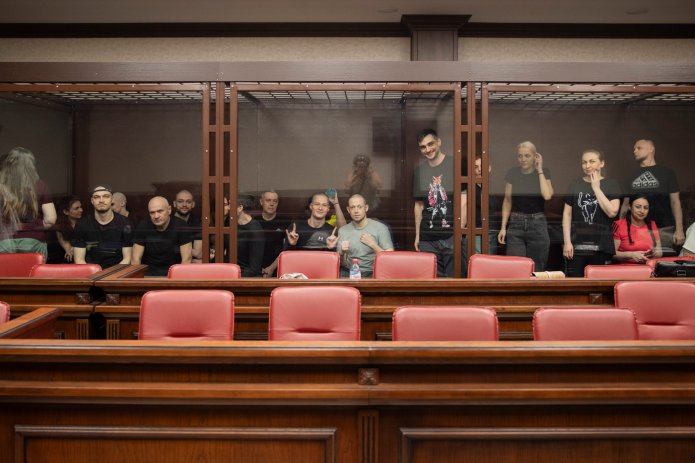
The case against another defendant, Alexander Ishchenko, was dropped due to his death. He died in a Russian pre-trial detention centre in July from shock, multiple rib fractures and blunt chest trauma.
In August, a prosecutor in Rostov requested sentences of 16 to 24 years in prison for the defendants.
In addition, another 18 prisoners — 2 women and 16 men — are charged in the case of service in the Aidar battalion. They are charged under the same articles as the defendants in the Azov case. Doctors Marina Mishchenko and Liliya Prutyan returned to Ukraine in September as part of a prisoner exchange with Russia.
Cases Related to the Offensive of the Ukrainian Armed Forces in the Kursk Region
Due to the invasion of the Ukrainian Armed Forces into the Kursk region, a new category of cases has emerged against journalists who covered the offensive by the Ukrainian army.
Among the first defendants in such cases were journalists of the Italian television and radio company RAI, Simone Traini and Stefani Battistini, who reported a story from the city of Sudzha in the Kursk region, as well as a correspondent for the American channel CNN, Nick Payton Walsh, and journalists from the TV channels Mi Ukraina and Hromadske, Olesya Borovyk and Diana Butsko. All of them were charged in absentia under the article on illegally crossing the state border of Russia (Part 3 of Article 322 of the Criminal Code). In September, they were all put on the wanted list. In total, as of 9 December 2024, 12 journalists from eight countries were known to have been charged under this article. At least four have been arrested in absentia.
Repression at the Legislative Level
The first repressive bill adopted in 2024 was a bill allowing the confiscation of property in the event of «crimes» committed under the articles on spreading «fakes» about the army (Article 207.3 of the Criminal Code) and public calls for activities against state security (Article 280.4 of the Criminal Code) — in both cases «for selfish motives» — and also expanding the grounds for depriving people of awards, ranks, and titles in the event of committing crimes. The authors of the bill motivated this by the need to deprive «traitors» who conduct «openly anti-Russian activities and directly support the enemy» of their property and titles.
That was followed by another bill that expanded the scope of legislation on «undesirable» organisations to include foreign and international organisations whose founders or participants are government agencies of foreign states, as well as a bill that prohibited the placement of advertisements on any resources belonging to foreign agents — this applies to Russian individuals and legal entities regardless of their form of ownership.
Furthermore, new amendments were introduced to the bill «On Amending the Federal Law ‘On Communications’», which had already been adopted in the first reading, requiring the owners of Telegram channels with an audience of more than 10 thousand subscribers to submit information about themselves to Roskomnadzor.
Another important step towards tightening censorship was the bill banning «propaganda of the refusal to bear children» — it was adopted in the fall of 2024, after being reviewed in 48 days.
On 12 December 2024, the State Duma adopted in the second and third readings a bill expanding the grounds for including individuals in the list of «extremists and terrorists» maintained by Rosfinmonitoring. Now, among other things, the basis for inclusion in the list may be the public dissemination of «fakes» about the Russian army and discrediting the Russian Armed Forces.
In addition, on 17 December, a bill on special ruble accounts for «foreign agents» was adopted in the second and third readings at once: any income and rewards that a «foreign agent» will receive from their intellectual activity and brands in Russia must be credited to a special ruble account. During the second reading of the bill, provisions were added to prohibit «foreign agents» from freely disposing of the money from their intellectual activity and the sale of their own property.
In the first reading (that is, there are still two readings to come, followed by approval by the Federation Council and signing by the president) in 2024, the State Duma adopted bills on:
- The ability for libraries to restrict access to books written by «foreign agents» or authors included in the Rosfinmonitoring list;
- A ban on advertising on the resources belonging to «extremist» and «undesirable» organisations (for example, Instagram and Facebook);
- A ban on participation in the activities of public chambers that applies to organisations and individuals in the register of «foreign agents», as well as to people with citizenship of or residence permits in other countries;
- Expanding the articles on treason, espionage and «confidential cooperation with a foreign state».
The second reading of the last of the listed bills was scheduled for as early as 17 December — there is a high probability that it will be adopted before the New Year. In particular, it expands the concept of «going over to the side of the enemy»: now it includes not only direct participation in military actions, but also «voluntary participation in the activities of enemy authorities, institutions, enterprises and organisations knowingly directed against the security of the Russian Federation». As Department One notes, after the amendments are adopted, «going over to the side of the enemy» will include virtually any cooperation with Ukrainian organisations that the Russian state deems «dangerous». The wording «participation in the activities» is noteworthy. The practice of applying criminal articles against «undesirable» organisations or extremist communities has shown that just about anything — reposting materials, participating in a conference etc. — can be classified as «participation in the activities».
In addition, a new article is being introduced to the Criminal Code — Article 276.1 («Providing assistance to the enemy in its activities knowingly directed against the security of the Russian Federation»).
Pressure on the LGBTQ+ Community
The year 2024 became a year of systemic repression against the LGBTQ+ community in Russia. The recognition of the «International LGBT Movement» as an extremist organisation by the Supreme Court of the Russian Federation, which came into force on 10 January, led to an escalation of criminal, administrative and legislative measures aimed at suppressing the rights and freedoms of LGBTQ+ people.
According to the expert opinion of a lawyer of the Coming Out group, the court’s decision also puts the employees, managers, volunteers and donors of LGBTQ+ organisations at risk.
instances of violation of the rights of LGBTQ+ people in Russia were recorded in 2024
According to the Coming Out group data as of 9 December 2024
Over the year, the Coming Out group recorded 279 instances of violations of the rights of LGBTQ+ people. Among them, 161 instances concerned individuals and 104 instances were related to legal entities and organisations. Another 14 instances included legislative initiatives aimed at further restricting the rights of the LGBTQ+ community.
Police raids against LGBTQ+ people have become a regular practice. In 2024, at least 24 raids were carried out in clubs, cultural spaces and at events related to the LGBTQ+ community in 12 regions of Russia. These actions were accompanied by detentions, violence, humiliation and administrative fines. Many establishments were forced to close after such raids, and the owners and organisers of the events started facing criminal charges for organising the activities of an extremist organisation (Article 282.2 of the Criminal Code).

The lawyers of the Coming Out group said this about the reasons for initiating criminal cases: «The sphere of providing services and selling goods for LGBTQ+ persons, based on the wording of the court decision, is in no way connected with extremism. However, it was precisely these spheres that were hit by the court decision. Of the 12 criminal cases initiated to date under Article 282.2 of the Criminal Code in connection with the extremist activities of the ‘international LGBT movement’, only one is connected with ‘LGBT activism’.»
Administrative pressure has also intensified. In 2024, 53 instances of prosecution of individuals for «LGBT propaganda» (Article 6.21 of the Code of Administrative Offenses) were recorded, including fines and arrests, as well as 48 instances of pressure on legal entities, including inspections, fines and closures. In addition, at least 57 fines were recorded for displaying symbols that the courts interpreted as «extremist» due to their association with the LGBTQ+ movement. Instances of prosecuting parents of LGBTQ+ teenagers attracted particular attention: in two instances, mothers were charged with «improper performance of parental responsibilities» (Article 5.35 of the Code of Administrative Offenses) for publications on social networks and, in one case, the father of a transgender teenager was deprived of his parental rights.
The situation is becoming worse due to new legislative initiatives. While the State Duma is establishing a working group to censor LGBTQ+ content and tighten the norms about «traditional values», regions are adopting new laws at their level; for example, Bashkortostan has banned mentioning LGBTQ+ in educational and medical institutions. These initiatives increase the level of stigmatisation and isolation of the LGBTQ+ community, paving the way for exerting even greater pressure on its representatives.
As the lawyer of the Coming Out group notes, 2024 has become the year of complete suppression of any manifestations of LGBTQ+ identity: «The wording of the anti-extremist legislation is so vague that it threatens any activity or private manifestations of the life of LGBTQ+ persons.»
Forced Deportations after the Crocus City Hall Attack
According to the representatives of the human rights organisation Department One, the authorities use every terrorist attack in Russia for populist purposes, for example, to find an ideological enemy and fight him. Law enforcement officers declared citizens of former Soviet Union countries to be the perpetrators of the terrible terrorist attack in the Crocus City Hall’s concert hall in the Moscow region, which took the lives of almost 150 people.
As Department One notes, law enforcement officers have already been paying close attention to Ukrainian citizens since 2022, but in the spring of 2024 the authorities began conducting showpiece raids targeting migrant workers from other countries, followed by mass deportations from Russia.
According to media reports, law enforcement officers targeted places where foreigners could likely be found: hostels, mosques, hostels, construction sites and markets. During such raids, people were detained without explanation and beaten, human rights activists said. The raids targeted citizens of Central Asian countries, as well as refugees who are not allowed to return to their country of origin, for example, citizens of Afghanistan.
In some regions, such as St. Petersburg, such raids take place almost every week, according to the reports of the press service of the Ministry of the Interior. At the end of March, St. Petersburg police officers conducted a full-scale operation called «Anti-Migrant», during which more than 15 thousand foreign citizens were prepared for deportation. They were charged with breaching the rules of entry to the Russian Federation or violating the regime of their stay in the country and conducting illegal work-related activities in the territory of the Russian Federation, and the courts imposed on the foreigners a fine of 5 thousand rubles and the penalty of self-organised or forced expulsion from Russia.
Number of decisions of the Ministry of Internal Affairs regarding foreign citizens
During such operations, foreign nationals have been expelled from Russia without waiting until their administrative ruling enters into force (it does after 10 days). Foreigners can indeed be expelled from the country without the right to appeal the ruling, but only in urgent circumstances.
Besides, Russian lawmakers have come up with new restrictions for foreigners who have obtained Russian citizenship, Department One noted. For instance, refusal to take an oath or to register with a military recruitment office may result in deprivation of citizenship for legally naturalised Russians. Prior to that, migrants with Russian citizenship were forcibly handed military draft notices and sent to the warfront.
Interest in foreign citizens has also increased on the part of secret service officers. Department One noted that they check migrants’ gadgets at the Russian border and also hack into their accounts.
Freedom of Assembly
arrests at public rallies in 2024
According to OVD-Info
As of 9 December 2024
The beginning of the year was marked by protests in Bashkortostan. We do not know the exact number of detained people there, so they are not included in the number above.
Of the total number of detained people, 672 were detained for participation in the events in memory of Alexei Navalny.
Number of detentions related to participation in the events in memory of Alexei Navalny
Bashkortostan
In early 2024, the Baymak District Court sentenced Bashkir activist Fail Alsynov to four years in prison under the article on «incitement to hatred» (Article 282 of the Criminal Code) for statements he had made at a rally. Three large rallies were held in support of Alsynov in the same month: in Baymak on 15 and 17 January and in Ufa on 19 January. The authorities immediately responded to the 17 January rally with a series of administrative cases involving several hundred people, and a criminal case on mass riots was initiated under Part 1 and Part 2 of Article 212 of the Criminal Code («Mass riots») as well as Part 1 of Article 318 of the Criminal Code («Use of violence against a representative of the authorities»): at least 76 defendants were taken to pre-trial detention centres.
Administrative articles under which the detainees were charged:
- Disobeying a lawful order of the police (Part 1 of Article 19.3 of the Code of Administrative Offences);
- Organising an unauthorised rally (Part 2 of Article 20.2 of the Code of Administrative Offences);
- Participation in an unauthorised rally that interfered with the functioning of infrastructure (Part 6.1 of Article 20.2 of the Code of Administrative Offences).
All of these articles involve administrative arrest, which allows law enforcement officers to detain a person for 48 hours awaiting trial. During this period of arrest, a criminal case may be initiated. That is what happened to at least 20 defendants: 16 of them were first detained and arrested under the article on disobeying a police order (Part 1 of Article 19.3 of the Code of Administrative Offences), another 4 people — first under Article 20.2 of the Code of Administrative Offences.
Penalties imposed on the defendants in administrative cases following the protests in Bashkortostan
Administrative cases continued to be initiated and heard by courts up until July 2024. In total, the courts received at least 556 administrative cases allegedly related to the rallies in support of Alsynov.
Number of administrative cases initiated following the rallies in Bashkortostan
The «Baymak Case»
people were charged in the «Baymak case»
There were numerous reports about the use of violence against the defendants during and after their detention, as well as during the investigation. Dim Davletkildin was taken to pre-trial detention with hematomas, bruises and scratches; their presence was admitted by the Federal Penitentiary Service. The man was hospitalised in a civilian hospital, where he was diagnosed with a fracture of the transverse process of the spine. Rifat Dautov died after being detained as a suspect. His relatives were not given information about the cause of his death, nor did they receive his death certificate.
Where are the defendants of the «Baymak case»
As can be seen in the chart, at least four defendants have already been sentenced. They will serve prison terms ranging from 4.5 to 5.5 years in a penal colony.
You can read more about the rally in Baymak in this report by OVD-Info. You can support the defendants of the «Baymak case» by clicking this link (In Russian or Bashkir).
«Foreign Agents»
people, organisations and associations were declared «foreign agents» in 2024
In 2024, the authorities initiated 1.5 times more administrative cases under Article 19.34 of the Code of Administrative Offences in relation to evasion from fulfilling the obligations of a «foreign agent» than in 2023.
Occupation of «foreign agents»
In 2024, the rate of expanding the register of «foreign agents» decreased compared to 2023 and 2022, but slightly exceeded the rate in 2021.
The chart below shows the reasons for removal from the list of «foreign agents». However, even after a person or organisation has been removed from the register, data about them remains in the public lists of the Ministry of Justice.
Reasons for excluding «foreign agents» from the register of the Ministry of Justice
Neither the slowdown in addition nor the exclusion of individuals and organisations from the register mean that the authorities have reduced the pressure on «foreign agents». We can even say that in 2024 the pressure has reached a more serious level than before, because now the state has actively begun to criminally prosecute people in the register.
Number of administrative cases initiated against «foreign agents»
As a result of the amendments introduced in 2022, a repeated administrative case under Article 19.34 leads to criminal responsibility. It was the mass administrative prosecution of «foreign agents» that paved the way for the authorities to launch a campaign of their criminal prosecution.
As of 9 December 2024, at least 32 people are facing charges under Article 330.1 of the Criminal Code («Evasion from the fulfillment of the obligations of a foreign agent»), 29 of them started facing charges specifically in 2024. Among the new defendants in cases of evasion from fulfilling the obligations of a «foreign agent» are the singer Monetochka (Elizaveta Gyrdymova), the rapper Oxxxymiron (Miron Fedorov), the politician Lev Shlosberg (one of the two individuals facing prosecution under Article 330.1 of the Criminal Code who remain in Russia) as well as the human rights activist and journalist Natalia Baranova.
Number of criminal cases initiated against «foreign agents»
A substantial share of «foreign agents» live outside Russia. Despite this, law enforcement officers conduct searches at their relatives’ homes. For example, in Kabardino-Balkaria, law enforcement visited the home of the parents of the emigrated Circassian activist Martin Kochesoko three times within a month and a half. In Magadan, they conducted a search at the home of the parents of the chief editor of Important Stories, Alesya Marokhovskaya, while in Voronezh, they searched the home of the parents of the former head of Navalny’s Voronezh headquarters, Yevgeny Karpov.
«Undesirable» Organisations
In 2024, the pace of expanding the lists of «undesirable» organisations increased compared to the previous year. As of 9 December, a total of 195 organisations had received this status, with 65 of them added to the register in 2024.
Types of activity of undesirable organizations
As of 9 December 2024, at least 168 administrative cases under Article 20.33 of the Code of Administrative Offences of the Russian Federation («Participation in the activities of an undesirable organisation») were referred to courts of first instance in 2024.
In 56 of these cases, we know the reason: the individual was fined for «participation» in a specific undesirable organisation. For instance, the highest number of fines were imposed for participation in the activities of Meduza.
Organisations the «participation» in which led to fines
A repeated penalty imposed under Article 20.33, as well as providing or collecting funds or organising the activities of an undesirable organisation are already grounds for initiating a criminal case under Article 284.1 of the Criminal Code («Conducting the activities of an ‘undesirable’ organisation»).
people began facing charges under Article 284.1 of the Criminal Code in 2024
Of them, 15 are facing charges for participation in various religious organisations, such as «AllatRa» or those associated with the Chinese spiritual practice system Falun Gong.
In addition, a case for organising the activities of an «undesirable organisation» was initiated this year against Kirill Martynov. He is the editor-in-chief of the media outlet Novaya Gazeta Europe, one of the founders of the educational project Free University and a member of the management of the Anti-War Committee — all of which have been declared «undesirable» organisations.
Also, in 2024, at least 8 sentences were handed down under Article 284.1 of the Criminal Code. At least one of them involves imprisonment — the Falun Gong follower Oksana Shchetkina was sentenced to two years in a penal colony.
Politically Motivated Pressure on the Representatives of Professional and Social Groups
Pressure on Human Rights Defenders
In 2024, the repressive system continues to exert targeted pressure on the human rights sector: organisations defending political and social human rights, ecology and animal rights. This conclusion was drawn by OVD-Info analysts as a result of their research on the pressure against human rights defenders.
The instances that are most easily accessible for numerical monitoring of repression are those in which human rights organisations, as well as human rights defenders as individuals, have received some negative status: currently, this includes 84 organisations and associations and 107 individuals with the «foreign agent» status, as well as 110 organisations whose activities have been declared «undesirable». If lawyers are included in the «foreign agent» register, as a rule, it means their disbarment, among other things. A striking example is the case of lawyer Mikhail Benyash, who is suing the Federal Bar Association — so far unsuccessfully. Moreover, in the past year, 22 human rights defenders began facing politically motivated criminal charges.
It is important to note that state pressure is not limited to judicial forms. Another manifestation of repression includes violations of the professional rights of lawyers, as well as obstruction of the work of public defenders. According to the data of a closed survey, about a half of lawyers regularly face such violations, including:
- Denying lawyers access to their clients in police departments and other state premises, especially during investigative actions and detentions;
- Searches conducted without a court order, as well as the inspection of lawyers upon entering the courts;
- «Dual defence», i.e., when in addition to the contracted lawyer, another court-appointed one is also brought in who often pursues the interests of the prosecution,
as well as other forms of repression.
Both lawyers and defenders without an attorney’s licence have reported instances of using physical force or threats of violence against them, as well as surveillance and hacking into their digital devices by secret service officers. In addition, searches, interrogations and the seizure of equipment were common tactics used by law enforcement in 2024 — a trend that has intensified following the emigration of many political activists. Lacking the ability to carry out investigative actions against the activists themselves, law enforcement officers may instead direct their efforts toward their lawyers and defenders.
As for the everyday forms of repression, many human rights defenders say that hostility towards them has been increasing recently both among law enforcement officers and, as a result of propaganda efforts, in society as a whole. Whereas before the war in some regions a human rights defender was able to obtain an official «badge» or the phone number of a high-ranking official to subsequently use these resources to help their clients, now nearly all doors are closed to them on almost all issues. The state increasingly establishes its own, controlled human rights defenders (for example, as part of public monitoring commissions within the Federal Penitentiary Service). However, when they do manage to secure involvement in the lives of defendants, it rarely ends in success. For instance, our lawyers reported that they increasingly feel «out of place» in courts, where efforts are made to have them removed as quickly as possible.
Repression through the Eyes of Defence Attorneys Working in Russian Courts
OVD-Info spoke to lawyers who were involved in politically motivated cases in 2024. We asked them to share how old and new repressive laws and practices have affected their work this year.
Three interviewees noted that in 2024 it became even more difficult for lawyers, especially defence attorneys, to exercise their right to freedom of speech, not only in court but also in their personal lives. They faced increased scrutiny from the state and had to «filter» both their defence speeches and statements unrelated to their professional activities. One defence lawyer shared that he became wary of adducing evidence on his own and now analyses it as carefully as possible to determine whether the prosecution might interpret it as discreditation or «fakes» about the army or find in it other reasons to initiate a new prosecution. According to him, this kind of «filtering» affects the quality of the defence. «Yet, self-censorship in such a situation is necessary, because if a lawyer ends up in the position of the defendant, it won’t make things easier for anyone. It will only make things worse, especially for the defendant, ” the defender stated.
On 28 November 2024, a court in Udmurtia sentenced the lawyer Dmitry Talantov to seven years in prison. By that time, he had already spent nearly two and a half years in custody on charges of spreading «fakes» about the army and inciting hatred by publishing anti-war posts. Colleagues link Talantov’s persecution to his work on the case of the journalist Ivan Safronov, who was sentenced to 22 years on charges of treason.
On the day of Talantov’s sentence, a court in the Moscow region considered a criminal case against another lawyer, Timur Idalov. He was sentenced to a year and 11 months of forced labour. The case was initiated over the phrase, «You are who, Inspector Cattani? But he was shot dead, ” that Idalov said to the prosecutor during one court hearing. Journalists linked Idalov’s case with his protocol of the interview with a former commander of PMC Wagner.
As of December 2024, Alexei Navalny’s lawyers are in pre-trial detention. Igor Sergunin, Vadim Kobzev and Alexei Liptser are charged with participating in an extremist community: according to the investigation, they facilitated regular transmission of information between Navalny and his associates, thus helping him continue to perform the function of the leader of an extremist community. On 17 December, the prosecutor requested sentences of over five years in a penal colony for each of the lawyers.
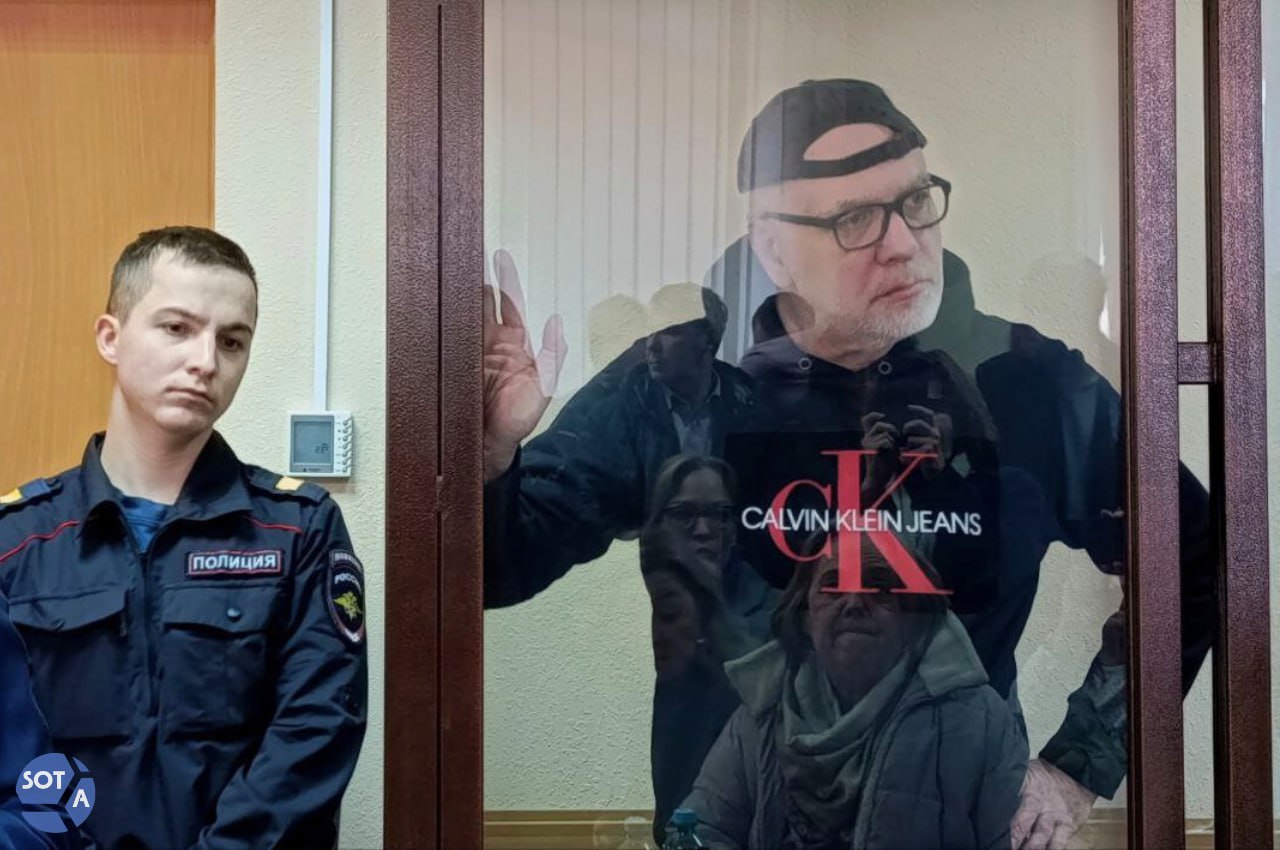
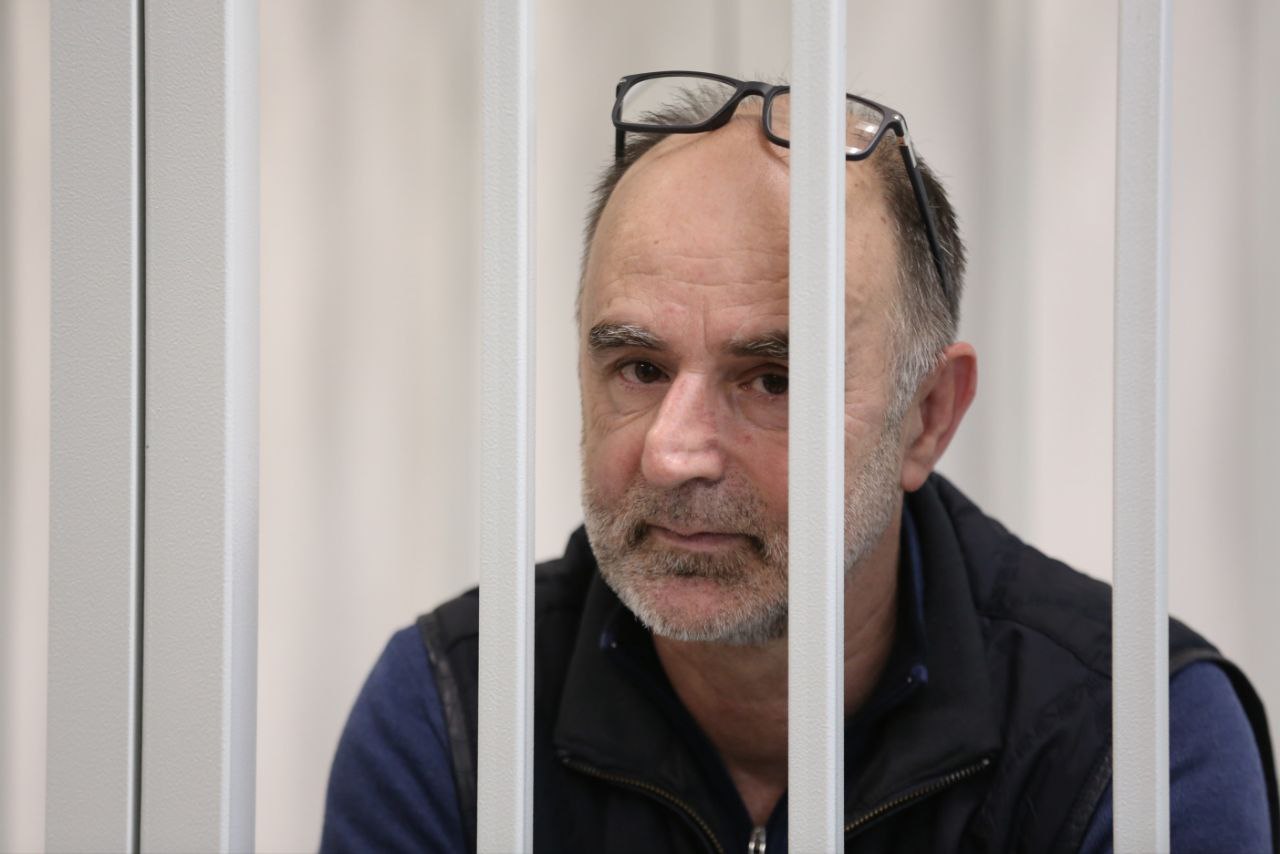
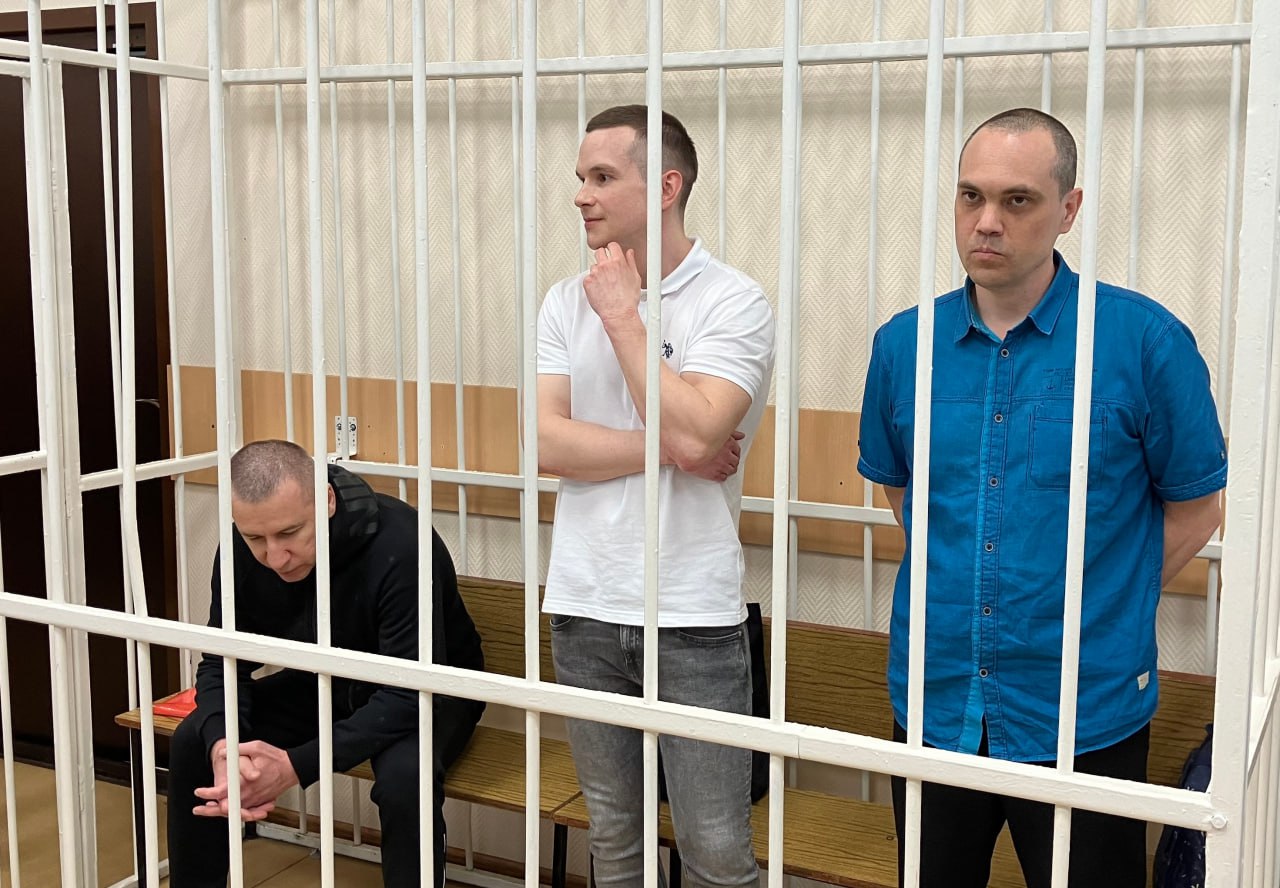
The persecution of lawyers and the forced self-censorship of those remaining at large, according to a person interviewed by OVD-Info, have contributed to the split within the professional community. «Many colleagues are afraid to openly express their opinion and support for lawyers stuck in the ‘cogwheels of the system’. Instead, they remain silent or blame the victims themselves, ” concluded the interviewee.
Another defence lawyer spoke about the aggravation of the problem when working in cases related to classified information and supervised by the FSB. The interviewee of OVD-Info emphasised that it is virtually impossible to challenge the classification of any data as a state secret. Moreover, access to such information can lead to a number of restrictions even for the lawyer. «Finding a lawyer for a case that is led by the FSB is practically unrealistic. They openly threaten lawyers with criminal charges, shamelessly invade their personal lives and ‘classify’ all the cases, ” concluded the lawyer.
Persecution of Teachers Charged with an Anti-War Stance
In 2024, the persecution of Russian teachers for expressing anti-war positions continued. OVD-Info gathered key data on the issue, spoke with teachers, and released a report (in Russian) on their repression following the start of the full-scale war.
The most visible form of pressure on teachers with anti-war positions for the general public are criminal cases. OVD-Info is aware that at least four teachers faced criminal charges in the first half of 2024. This year, the trend of initiating cases with a significant time gap between the alleged act and the start of the criminal prosecution continued. Victims of repression among teachers in both 2023 and 2024 were predominantly those who spoke out against the war at the beginning of 2022.
Teachers often face extrajudicial pressure. Such pressure is initiated by pro-war activists. These activists frequently resort to cyberbullying tactics publishing information online about alleged legal violations by anti-war teachers or even entire institutions. They also call on others to file reports against them. In April 2024, this approach led to the closure of «Novocollege» in Novosibirsk, whose founder had openly opposed the invasion of Ukraine and refused to include the «Conversations about Important Things» class in the curriculum.
A symbiosis of extrajudicial and institutional pressure occurred in the instance of the persecution of the teacher Natalia Taranushenko, a local of the Moscow region. In the spring of 2022, Taranushenko discussed the events in Bucha in one of her classes, after which the father of her students began filing denunciation reports against her and kept doing so for two years, demanding her prosecution. More than two years later, in June 2024, a criminal case was initiated against the teacher for spreading «fakes» (Part «e» of Article 207.3 of the Criminal Code). After this, Taranushenko left Russia. In July 2024, she was detained in Armenia. The local Armenian authorities cited an international arrest warrant against her issued by the Russian Ministry of Internal Affairs and stated they were required to cooperate with Russia on such matters. She was later released on recognizance to show up at the police.
OVD-Info spoke with teachers who experienced persecution after February 2022. Just over half of them noted that the situation developed quickly, often starting immediately with the initiation of a case. Others shared that the pressure was gradual, and did not immediately lead to the need to urgently leave Russia. Like Taranushenko, after experiencing the pressure, they continued to work in Russia and only some time after their allegedly committed act took place they started facing a real threat of losing their freedom or realised that they could no longer work in their profession in Russia.
Pressure on Schoolchildren and Students
Types of persecution of students and teachers in Russian universities in 2024
According to Leonid Spirin, the editor-in-chief of the Groza media outlet, the main trend this year in working with the youth is the authorities’ push to increase the birth rate: «Many regions have introduced various benefits for giving birth in Russian universities. In general, some surveys are conducted on reproductive health among male and female students. Perhaps this is the most significant, most obvious trend that intensified over the past year.»
students were charged under «anti-war» criminal articles
OVD-Info data as of 12 December 2024
Of the 44 students, 4 have already served their sentences. Current data on the status of cases and the whereabouts of the defendants in «anti-war» criminal cases can be found here.
Conclusions
As can be seen from the numbers above, in some categories of data we observe a trend toward a decrease in the number of persecutions.
Does it mean that there is less repression? Based on the provided data, such a conclusion cannot be drawn, as the number of cases — both administrative and criminal — depends on the presence of publications, statements, protest and other activities that can lead to persecution on political grounds. For example, in 2024, there was a decrease in the number of instances of repression against teachers who, according to the state, oppose the aggression against Ukraine. The reasons for this trend could lie in the fear of publicly speaking out, as well as the forced emigration and dismissal of the most active teachers during the first year of the war. Another reason is self-censorship. Some of the defenders that OVD-Info interviewed faced this. They also noted the lack of support within the professional community, and the tightening of the legislation may affect the quality of their work in the future.
In the third year of the war, as a result of the impact of repressions in previous years, the intensity of both protest activity as well as online and offline activity in general — according to our observations — are decreasing or are completely moving underground into closed formats. Mass protests and solitary pickets, if they are to be held without «dispersals», can be exclusively focused on social issues. The largest protests in 2024, and the biggest ones unrelated to the war since 2021, took place in Bashkortostan and ended in a wave of criminal cases. The decrease in protest activity affects the number of criminal and administrative cases, but does not signify a weakening of the repressive response.
Moreover, we can see a refocusing of the repressive apparatus. For example, law enforcement officers have started to more actively pursue individuals not based on their actions but on their status — whether inherent or acquired. This includes factors such as sexual orientation, national affiliation or even the label of a «foreign agent».
In particular, the year 2024 was marked by an increased number of raids on civil events under the guise of fighting the LGBTQ+ community, which has effectively been recognised as extremist within Russia. After the terrorist attack at the Crocus City Hall, the authorities also initiated mass deportations of foreign citizens.
The persecution of «foreign agents» has also intensified, especially by means of initiating criminal cases.
In addition, a significant portion of persecutions now targets the «prisoners of the wartime» — people charged with more radical actions than statements or protest activities, directly or indirectly linked to the invasion of Ukraine. We do not always know whether the subjects actually committed what they are charged with or what their position is; therefore, these cases are not included in the general statistics of politically motivated criminal cases. However, in some of them, we can discern a political motive or at least «politicisation» of the committed act by the state — for example, when a failed arson, with no serious consequences, is classified as a terrorist act and the charged individual is portrayed almost as an enemy spy. It is especially difficult to speak about cases initiated under articles on treason and espionage, but the very fact that the number of such cases has significantly increased since the start of the full-scale invasion and that, since 2022, many defendants in these cases have been accused of having ties with Ukraine, indicates that the authorities are «politicising» people’s actions in these instances as well. However, we cannot claim the presence of definitive political motivation in these instances.
Taking into account the aforementioned factors, we can state that the resources of law enforcement are being redirected towards such persecutions — and this fact, among other things, leads to a decrease in the level of persecutions in other categories that are more familiar to us.
Nevertheless, almost every day we learn about new defendants in new «anti-war» criminal cases. As of the writing of this report, we are aware of more than 1,100 defendants.
Eventually, both the war and political repression in Russia will come to an end. In our view, the main agent of the future transformation of the state will be civil society. Therefore, take care of yourselves and do not lose hope. Support OVD-Info.


